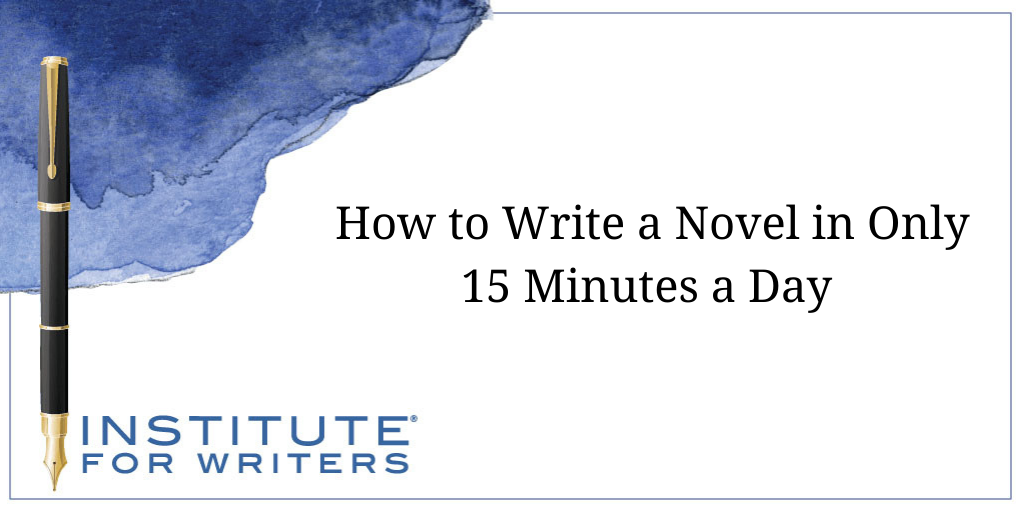
Back to School: Lifelong Learning is Where It’s At
Opportunities for lifelong learning about writing are abundant and during this back-to-school season it is easy to get inspired.

Everyone has seen those relentless ads on television or YouTube that promise astonishing results from moisturizers, exercise programs, and weight-loss plans. Even if you don’t quite believe in all the testimonials and the hype, you might feel a slight temptation to dial a telephone number or click through to a website. But in the end, you conclude that they’re overpromising on a product that will underdeliver.
With that in mind, I will still insist on the following with complete sincerity: You too can write a novel in only 15 minutes a day.
 15 Minutes a Day? Really?
15 Minutes a Day? Really?That claim might seem completely unreasonable when 15 minutes is hardly enough time for most of us to go through our usual pre-writing rituals, but I’m confident that it can be done. While I’ve been fortunate enough to have longer blocks of time in which to work during most of my adult writing life, I know of two women who managed to complete their novels by sitting down every single day for a short amount of time despite their other challenging commitments. If and when either of them had the opportunity to spend a glorious afternoon with their characters, they did, of course, take it. But the vast majority of their projects were written in short bursts.
I met the first of these two writers at a retreat. She was a woman who was supporting herself by writing children’s nonfiction articles, test passages, and other various kinds of work-for-hire. After a day spent researching and writing, she didn’t have much creative energy left for the adult novel that she desperately wanted to tackle. Instead of a specific block of time, she committed herself to writing three sentences a day, but it was clear from our conversation that these were very short sessions. Sentences became paragraphs. Paragraphs became pages. Pages became fully developed scenes. Those scenes were linked by transitions. Eventually they became a complete novel.
The other writer was—and is—a good friend. A newly-widowed single mother of two, she was working full time while finishing up a master’s degree. But she knew that one of the best things that she could do for herself in this soul-crushing time was to give herself permission to write. She granted herself 15 minutes a day.
Naturally, she couldn’t gradually lure herself to the keyboard with the usual sets of tricks. She had to be productive from the first second that she sat down. Since she only had 900 of them, every single one had to count. For those of us who don’t feel like we are getting into any kind of groove for our first half hour of work, the thought of producing anything worth keeping in such a short amount of time is almost inconceivable.
But here’s something to think about. The muse can be trained. When challenging circumstances intervene, even those of us who usually have more time and energy to plow into our stories can learn how to work in these short, productive sprints.

If you do decide to try this approach, don’t expect too much from yourself in those first few sessions. But it won’t take long before some of that muscle memory from those timed essay exams back in high school or college will come back to you. You may only emerge with what Anne Lamott classically described as “the shitty first draft” but keep two important things in mind:
Even though I usually had more time that I could devote to my work, there were times in my life that I embraced the 15 minutes a day minimum in order to stay connected to my characters. In those stressful months immediately before and after a cross-country move, I would sit down with a notebook. The computer was too great of a temptation for me. At other times, when an editor or agent asked for revisions on a project, I tried to dedicate 15 minutes a day to my new characters so that I wouldn’t lose touch with their voices and their concerns.
But there will be times during family emergencies where even the bare minimum of three sentences or 15 minutes might feel impossible. In the month that followed my husband’s major surgery, I didn’t feel the slightest inclination to return to my characters until he was able to return to work for his first half day. In the weeks that I spent clearing my parents’ condo after my father’s death, I couldn’t bring myself to write a word. Not one word. I was physically and emotionally exhausted.
So I’m not going to promise that you can write every day. But if you make a commitment, words will become sentences. Sentences will become paragraphs. Paragraphs will become scenes. Scenes will be linked by transitions, and you will have a complete novel.
Kristin Wolden Nitz has had sixteen different addresses in eight different states since graduating from college. When she tells friends and family that she’s not moving again, they laugh. Kristin splits her time between writing novels and serving as one of our instructors. Kirkus described her novel Suspect as “intriguing, suspenseful fun.”

Opportunities for lifelong learning about writing are abundant and during this back-to-school season it is easy to get inspired.

As you seek to create characters, you will also want to work to strengthen the interiority of those you are writing about.

Character development is an interesting part of writing but may be among the most time consuming and significant in your story.
1000 N. West Street #1200, Wilmington, DE 19801
© 2024 Direct Learning Systems, Inc. All rights reserved.
1000 N. West Street #1200, Wilmington, DE 19801
© 2024 Direct Learning Systems, Inc. All rights reserved.
1000 N. West Street #1200, Wilmington, DE 19801
© 2024 Direct Learning Systems, Inc. All rights reserved.
1000 N. West Street #1200, Wilmington, DE 19801
1000 N. West Street #1200, Wilmington, DE 19801
10 Comments